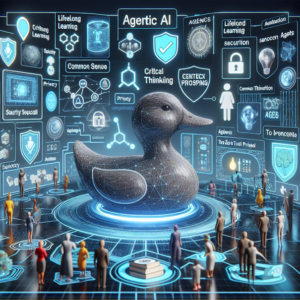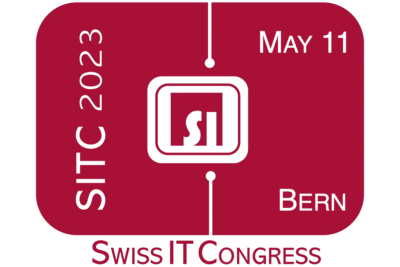In the age of artificial intelligence (AI) and corresponding “AI readiness”, it is crucial for the board of directors of modern companies to adapt their corporate culture and way of working in order to remain both innovative and competitive. While many talk or dream of ‘business intelligence’ and even ‘business excellence’, the necessary foundation in the form of a suitable digital DNA strategy, a corporate culture and a correspondingly aligned mindset is often lacking at the operational level. An optimised and digitally supported decision-making basis at strategic and operational level for the continuous further development of a company can be achieved through holistic organisational development, a company-specific digital DNA and an in-depth examination of algorithm-based decision optimisation and the areas of data management and data science.
The relevant significance and methodology of the digital DNA
The digital DNA of a company and also of the board of directors / management describes the dynamic ability and also serious willingness to invest and innovate in order to continuously adapt and innovate to the changing digital landscape. It is precisely this kind of digital DNA that forms the basis for better achieving further, future ‘XY readiness’ after the current ‘AI readiness’, so to speak ‘the yellow of AI’. A strong digital DNA is crucial for success in the digital age. It comprises a tailored mix of toolset, skillset and mindset
Toolset: The right tools and technologies in the ‘toolbox’ provided by the organisation or sometimes demanded by the board of directors / management are essential to support the digital transformation. This includes modern apps, tools and AI assistants/agents/automation that increase efficiency and productivity.
Skillset: The personal skills and constantly optimised abilities of employees must be continuously developed in order to meet the new requirements. At the strategic level, this also requires the Board of Directors and management to acquire appropriate knowledge about technological developments and trends (e.g. by means of ‘Technology Review & Outlook’ keynote speeches / workshops). At the operational level, regular training and further education in a new learning culture in favour of the approach of lifelong, explorative learning is now essential. The introduction of so-called ‘low-code’ and ‘no-code’ technologies in particular offers an excellent opportunity to expand employees’ digital skills by enabling them to help develop their own automations, optimisations and even smaller applications and to automate business processes without the need for in-depth programming knowledge. This helps to increase the company’s efficiency and innovative capacity while also promoting the personal and professional development of employees, including their ‘digital sovereignty’. Other newly developed ‘soft skills’ include so-called “metacognitive” skills such as ‘critical thinking’, ‘common sense’ and the ability to ‘ask critical questions and make decisions in the right context’. These skills are particularly relevant in the field of ‘prompt engineering’ and in dealing with artificial intelligence in general.
Mindset: An open and innovative mindset is crucial in order to utilise new technologies effectively. This includes the willingness to continuously develop, to help shape task-orientated teams or agile project methodologies (e.g. Design Thinking, Scrum, Kanban) and to accept new efficiency-enhancing working methods and tools and, if necessary, to ‘cut off old habits’. Sustainable changes and previously unattainable optimisations can only be achieved if the general mindset of the entire organisation changes. In particular, the board of directors and management should engage in an ongoing, open dialogue with appropriate critical questions and sometimes visionary innovations regarding the current or future business model.
The role of the Board of Directors and change management
A successful digital transformation cannot take place without strong and sometimes visionary leadership. The board of directors and the appointed, involved management must be able to formulate a clear vision and digital DNA strategy for the future and motivate (from ‘must’ to ‘want’), empower and inspire their teams to achieve this shared mission through appropriate change management.
They play a crucial role in creating a new culture and mindset that supports change and innovation, promotes internal ‘influencers for digital’ and also invests in them proactively and sustainably.
In addition to the necessary measurability and transparency, appropriate trust should also be placed in defined stakeholders, particularly in the relevant phases of prototyping and innovation, so that these time-consuming but potentially creative phases are not hindered by micromanagement. The right framework conditions and investments today can lead to future successes tomorrow. In the case of far-reaching changes and innovations in the so-called ‘valley of tears’ or even ‘valley of death’, which is usually permanent, worthwhile developments should also be supported with further investment and serious support from the board of directors if necessary. Especially here, countries and start-up world leaders such as the USA are very resilient and persistent.
Processes and collaboration
Organisations must have the right processes and methodologies in place to support the sometimes ‘data-driven’ efficiency optimisation and ultimately digital transformation. These should be agile and adaptable to enable secure and modern collaboration and innovation.
Effective collaboration between different departments, ‘key users’ of applications, as well as traditional, also ‘analogue’ knowledge and experience carriers and clear communication are crucial to achieving both “digital” and traditional, ‘analogue’ goals. The Board of Directors in particular should work with the appointed management to ensure that the appropriate framework conditions are in place.
Increasing efficiency and optimising quality through AI
The introduction of AI tools such as Microsoft Copilot can help to increase efficiency and optimise working methods and data management.
These tools support and automate repetitive and research-intensive tasks and allow employees to focus on more important and complex tasks.
The use of AI can also lead to further optimisation of quality, knowledge management, the promotion of internal talent (knowledge carriers and experience carriers) and ultimately to competitive employer attractiveness by centralising and further developing internal knowledge and process expertise and making this visible and even competitive in the environment and competition.
The board of directors and management should not just discuss it in theory or hear about it, but should actively engage with AI in general, AI tools and technological developments as important stakeholders and gain their own experience. On this basis, they can provide valuable input and ask well-founded questions.
Data protection and security
Another important aspect (or ‘homework’ that remains unchanged, especially for the Board of Directors with its related issues of joint responsibility and directors’ and officers’ liability) of digital transformation is data protection and data security. Data protection and technical data security, which are primarily characterised by regulation, play a central role in digital transformation and especially in the use of AI. Among other things, it must be ensured in organisational and technical terms that personal or company-sensitive data is not used undesirably for training purposes, for example, or even made public via detours. This is ensured through strict data protection/data security guidelines, cybersecurity sensitisation of employees and restrictive compliance standards.
The Board of Directors and management should be appropriately informed about corresponding audits and reports and sensitised to the dynamic threat situation in the area of cybersecurity. This should be the subject of an ongoing discussion or a recurring item on the agenda.
New learning culture in training, further education and awareness-raising
In order to fully utilise the benefits of digital transformation, it is important that employees receive continuous training, further education and awareness-raising. Participation from the Board of Directors and management is welcome and also sends a clear message to the company.
An innovative training concept based on general information, first steps, prototyping, use cases and, where appropriate, ‘fast fail’/‘trial error’ and ‘explorative learning’ can support the necessary agility of an organisation in the current dynamic of technological developments and trends. This enables participants to become experienced users (‘key users’) or knowledge carriers through the development and utilisation of use cases and prototyping.
Conclusion: Success through cultural change and an adapted mindset as the basis for digital maturity
The new digital DNA culture in the age of AI requires a comprehensive adaptation of corporate culture, leadership, processes and collaboration. By utilising modern tools and technologies, continuously training employees and adhering to strict data protection guidelines, companies can increase their efficiency and remain competitive. There are numerous impressive examples of how accompanied companies can successfully overcome these challenges, seize the opportunities of digital transformation and evolve from a traditional digital organisation to a kind of data-driven ‘DevOps’ organisation (an organisation that integrates software development and IT operations processes to work more efficiently and agilely).
Such a cultural change towards a “digital DNA” must recognise no boundaries between operational and strategic levels and should also involve all players, stakeholders and board members horizontally and vertically.
Fridel Rickenbacher quote: ‘At the heart of digital innovation is not the technology alone – but the strategy, wisdom and culture to use it correctly in order to generate optimised efficiency and a better basis for decision-making in the future.’Weisheit und Kultur, sie richtig einzusetzen, um damit eine optimierte Effizienz und künftig bessere Entscheidungsgrundlagen zu generieren.“

Fridel Rickenbacher is a former co-founder, co-CEO, partner, member of the Board of Directors and now a participating “entrepreneur in the company” / “senior consultant” at Swiss IT Security AG / Swiss IT Security Group. At federal level, he is represented as an expert and actor in “Digital Dialog Switzerland” + “National Strategy for the Protection of Switzerland against Cyber Risks NCS”. In his mission “sh@re to evolve”, he has been active for years as an editorial member, expert group and association activist at e.g. SwissICT, swissinformatics.org, isss.ch, isaca.ch, bauen-digital.ch in the fields of digitalization, engineering, clouds, ICT architecture, security, privacy, data protection, audit, compliance, controlling, information ethics, in corresponding legislative consultations and also in education and training (CAS, federal diploma).
This article was first published in Schwyzer Gewerbe magazine in January 2025 and is reproduced here with the author’s permission.
Photo: AI generated.








